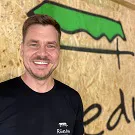This week we already reported on the first part of the Organic Summit in Zollikofen. This article focuses on the presentations on regional value chains and innovative forms of marketing.
Organic vegetables more important in retail and direct marketing
Anja Vieweger of the Research Institute of Organic Agriculture (FiBL) presented a study by the institute in which 500 households each in Switzerland, France, Spain and Italy were surveyed about their food purchasing behavior. According to the surveyed households, what was most important was that the produce was produced in the region or domestically and that the vegetables carried a good flavor. Going to the supermarket averaged about 90-95% percent across all countries, while shopping at discount stores ranged from 30-40%. For weekly markets, it again varied from about 20 in Switzerland to up to 55% in Italy. "I can well imagine that buying behavior in online retail has changed a lot in the last two years," Vieweger says. Sales for Swiss organic vegetables in retail as well as direct marketing would have been greater than sales for conventionally produced goods.
of the Research Institute of Organic Agriculture (FiBL) presented a study by the institute in which 500 households each in Switzerland, France, Spain and Italy were surveyed about their food purchasing behavior. According to the surveyed households, what was most important was that the produce was produced in the region or domestically and that the vegetables carried a good flavor. Going to the supermarket averaged about 90-95% percent across all countries, while shopping at discount stores ranged from 30-40%. For weekly markets, it again varied from about 20 in Switzerland to up to 55% in Italy. "I can well imagine that buying behavior in online retail has changed a lot in the last two years," Vieweger says. Sales for Swiss organic vegetables in retail as well as direct marketing would have been greater than sales for conventionally produced goods.
Creating new organic value chains
Felix Schmidling  of Franken-Gemüse Knoblauchsland eG spoke about the GemüseWert project, which is supported in part by funding from the German Federal Organic Farming Program (BÖLN). "We are a marketing platform and, among other things, also take care of the design around purchasing as well as compliance with the quality seals." In addition, the company is committed to networking various groups within the organic value chain. In this regard, companies are promoted and supported through active organic conversion assistance as well as new product range developments. "In order to tackle food waste, it is important that all partners communicate on an equal footing and that all players along the chain are involved."
of Franken-Gemüse Knoblauchsland eG spoke about the GemüseWert project, which is supported in part by funding from the German Federal Organic Farming Program (BÖLN). "We are a marketing platform and, among other things, also take care of the design around purchasing as well as compliance with the quality seals." In addition, the company is committed to networking various groups within the organic value chain. In this regard, companies are promoted and supported through active organic conversion assistance as well as new product range developments. "In order to tackle food waste, it is important that all partners communicate on an equal footing and that all players along the chain are involved."
Fresh vegetables back to the neighborhoods
Jürg Burri of Rüedu AG presented a new concept for neighborhood stores in Switzerland. According to Burri, more than 50% of neighborhood stores had already "died out." Therefore, the StartUp company has set itself the goal of making neighborhood life more attractive again throughout Switzerland with Läderli. The 18m2 stores offer fresh and local food.
new concept for neighborhood stores in Switzerland. According to Burri, more than 50% of neighborhood stores had already "died out." Therefore, the StartUp company has set itself the goal of making neighborhood life more attractive again throughout Switzerland with Läderli. The 18m2 stores offer fresh and local food.
"People don't trust companies, they trust faces"
Marketing e xpert Roger Basler de Roca emphasized that for the marketing of one's own products, a well-positioned website would achieve more than advertising via social media, although the latter should not be neglected either. According to de Roca, it makes more sense to play on the economy of attention through targeted social media campaigns. "People don't trust companies, they trust the face behind them," says de Roca. Attention is attracted less by a polished corporate appearance and more by personal contact.
xpert Roger Basler de Roca emphasized that for the marketing of one's own products, a well-positioned website would achieve more than advertising via social media, although the latter should not be neglected either. According to de Roca, it makes more sense to play on the economy of attention through targeted social media campaigns. "People don't trust companies, they trust the face behind them," says de Roca. Attention is attracted less by a polished corporate appearance and more by personal contact.
"Retailers should bear more responsibility in production"
Manuela Kägi of Biopartner Schweiz AG s ays the company wants to take more responsibility for individual organic retailers. From agriculture, to production, to trade, to the consumer: Biopartner is trying to improve the way food is handled along the entire chain, she said. For Kägi, taking responsibility for the value chain also means shedding more light on the story behind certain products and communicating this appropriately within the chain.
ays the company wants to take more responsibility for individual organic retailers. From agriculture, to production, to trade, to the consumer: Biopartner is trying to improve the way food is handled along the entire chain, she said. For Kägi, taking responsibility for the value chain also means shedding more light on the story behind certain products and communicating this appropriately within the chain.
Vegetable subscription as a closed system
The last presentation was given by Regina and Jürg Moser of natürlichMoser. The couple presented their vegetable subscription system, which is a closed system designed to make surrounding customers aware of seasonal and regional organic products. "Our customers are supplied exclusively with our own products. The inventory is not increased by additional purchases," said Regina Moser. As a result, she says, less waste is produced and even unsightly vegetables are recycled. In doing so, the Moser family wants to make its customers aware of annual fluctuations, yields and the different qualities.
For more information:
Bärner Bio Bure
Hof 697c
3454 Sumiswald
Event Bio-Gipfel
+41 (0) 34 461 82 73
info@bio-gipfel.ch
www.bio-gipfel.ch
